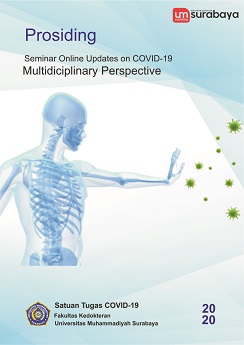Dampak Pandemi COVID-19 Pada Anak
Abstrak
AbstractCOVID-19 (Corona Virus Infection Disease 2019) is an acute infectious disease caused by a
virus called SARS-CoV-2, which stands for Severe Acute Respiratory Syndrome Coronavirus-
2. This disease is generally characterized by symptoms of acute respiratory infection (ARI)
such as fever, cough, painful swallowing and disorders of other organs such as the heart,
kidneys, digestive system, nerves, eyes, skin, ENT, and others. It can also occur without
symptoms at all. At first the disease was discovered in Wuhan City, Hubei Province, China at
the end of December 2019. In Indonesia the first cases of COVID-19 were reported on March
2, 2020.The impact of the Pandemic on children needs special attention. Based on the causes,
SARS-CoV-2 infection in children is distinguished, limited access to health services, decreased
family economic capacity and due to school closures or distance learning. In the short term,
the impact of a pandemic can increase the number of morbidity or disease, increase the
mortality rate due to late diagnosis and treatment, reduce immunization coverage, and reduce
nutritional or nutritional compliance. Meanwhile, in the long term disease outbreaks that can
be prevented by immunization can arise, increasing the prevalence of stunted and very
underweight children, developmental disorders, including psycho-social and mental
development and future generations with loss of the actual learning period.
Keywords : COVID-19, children, impact of pandemic
Referensi
World Health Organization (WHO). (2020). 8 Coronavirus Disease COVID-2019.
https://www.who.int/docs/default-source/coronaviruse/situation-reports/20200607-covid-19-
sitrep-139.pdf?sfvrsn=79dc6d08_2.
Kementerian Kesehatan RI. (2020). “Pedoman Pencegahan Dan Pengendalian COVID-19.â€
Kementrian kesehatan Repbulik Indonesia: 0–115.
Liguoro, Ilaria et al. (2020). “SARS-COV-2 Infection in Children and Newborns: A Systematic
Review.†European journal of pediatrics. http://www.ncbi.nlm.nih.gov/pubmed/32424745.
Zhao, W. et al. (2020) ‘Relation between chest CT findings and clinical conditions of coronavirus
disease (covid-19) pneumonia: A multicenter study’, American Journal of Roentgenology,
(5), pp. 1072–1077. doi: 10.2214/AJR.20.22976.
IDAI (2020) ‘Panduan Klinis Tata Laksana COVID-19 pada Anak IKATAN DOKTER ANAK
INDONESIA’.
Kementerian Kesehatan RI (2020) ‘Pedoman Pencegahan dan Pengendalian COVID-19’,
Pedoman kesiapan menghadapi COVID-19, pp. 0–115.
7.Susilo, A. et al. (2020) ‘Coronavirus Disease 2019 : Tinjauan Literatur Terkini Coronavirus
Disease 2019 : Review of Current Literatures’, Jurnal Penyakit Dalam Indonesia, 7(1), pp. 45–
Dong, Y. et al. (2020) ‘Epidemiology of COVID-19 Among Children in China’, Pediatrics,
(6), p. 20200702. doi: 10.1542/peds.2020-0702.
Huang, C. et al. (2020) ‘Clinical features of patients infected with 2019 novel coronavirus in
Wuhan, China’, The Lancet, 395(10223), pp. 497–506. doi: 10.1016/S0140-6736(20)30183-5.
10.Ansel H. et al. 2020. COVID-19 in 7780 Pediatric patients: A systematic review. ElClinical
Medicine 24, https://doi.org/10.1016/j.eclinm.2020.100433
11.Castagnoli R, et al. (2020).Severe acute respiratory syndrome coronavirus 2 (SARS-CoV-2)
infection in children and adolescents: a systematic review. JAMA Pediatr 2020 April 22. doi:
1001/jamapediatrics.1467.
Souza T, et al. (2020). Clinical manifestations of children with COVID-19: a systematic review.
Pediatr Pulmonol 2020 June 3. doi: 10.1002/ppul.24885.
13.Panahi L, Amiri M, Pouy S. (2020) Clinical characteristics of COVID-19 infection in
newborns and pediatrics: a systematic review. Arch Acad Emerg Med 2020;18:e50. [20] Mustafa
N, Selim L. Characterisation of COVID-19 pandemic in paediatric age group: a systematic
review and meta-analysis. J Clin Virol 2020 May 8. doi: 10.1016/j.jcv.2020.104395.
14.Centers for Disease Control and Prevention (2011). The CDC Guide to Strategies to Increase
Physical Activity in The Community. Strategies to Prevent Obesity and Other Chronic Disease
Brown DR, Heath GW, Martin SL. (2010).Promoting physical activity: a guide to community
action. 2nd ed. Champaign (IL): Human Kinetics.
Robert Wood Johnson Foundation.(2009).Active education: physical education, physical activity46 | H a l a m a n
and academic performance. Active Living Research. Research Brief; Available at
http://www.activelivingresearch.org/ resourcesearch/summaries.
Centers for Disease Control and Prevention.(2020) Resources for Emergency Health
Professionals. Health Alert Netw https://emergency.cdc.gov/han/2020/ han00432.asp
CDC COVID-19 Response Team (2020) ‘Coronavirus Disease 2019 in Children - United States,
February 12-April 2, 2020.’, MMWR. Morbidity and mortality weekly report, 69(14), pp. 422–
doi: 10.15585/mmwr.mm6914e4.
Cristiani, L. et al. (2020) ‘Will children reveal their secret? The coronavirus dilemma’, European
Respiratory Journal, 55(6), p. 2001617. doi: 10.1183/13993003.01617-2020.
Sun, D. et al. (2020) ‘Clinical features of severe pediatric patients with coronavirus disease 2019
in Wuhan: a single center’s observational study’, World Journal of Pediatrics. Springer
Singapore. doi: 10.1007/s12519-020-00354-4.






